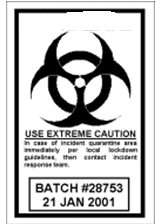responsible for ensuring safety of our foods
FDA
how to identify a patient
one of the following: ID on wristband, patient states name, patient states birthday
types of solutions in the healthcare setting
name 1: medications, chemicals for cleaning and/or lab
2 ways to show respect for patient's privacy
knock before entering room, keep patient covered during procedures
wheels on wheel chair should be locked when....
assisting the patient into the wheelchair
determines and enforces safety practices in the workplace
OSHA (Occupational Safety and Health Organization)
provides research and standards related to the control of disease and injury
CDC (Centers for Disease Control)
number of times that you must read the label on a medication and/or solution bottle
3
maintains requirements that must be followed to protect healthcare workers from hazardous body fluids
Bloodborne Pathogens Standard
leave the patient's bed in the ___ position before you leave the room
low
responsible for regulating lab testing on human tissues and specimens
CLIA (Clinical laboratory improvement amendment)
Manufacturers must provide this document for all chemicals and hazardous materials
MSDS or SDS (material safety data sheets or safety data sheets)
document that provides information about first aid treatment for accidental eye/skin contact with a chemical or solution
MSDS (material safety data sheet) or SDS (safety data sheet)
3 of the following: blood, urine, saliva, mucous, reproductive secretions, stool
this may help to prevent/relieve dizziness and lightheadedness before assisting patient out of bed and into wheelchair
swing legs back and forth/point toes forward and backwards
provides standards for healthcare safety, quality and operations throughout the world
ISO (International Standards Organization)
you should do this before and after every patient contact, procedure, and/or whenever necessary
wash your hands
where to store chemicals including medications
locked cabinet, cart, or closet
3 main diseases transmitted or caused by exposure to blood and or bodily fluids
hepatitis B virus, hepatitis C virus, HIV/AIDS

biohazard symbol/sign
responsible for safety of medical devices for human use
FDA (Food and Drug Administration)
adapting work environment for efficiency and safety
ergonomics
how to hold medication bottle when pouring into medication cup
label underneath your palm
when will you wash your hands
before and and after any patient contact and whenever you feel they have been contaminated
hazardous ingredient in mercury
mercury